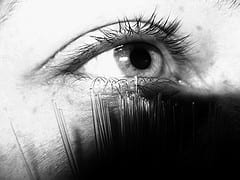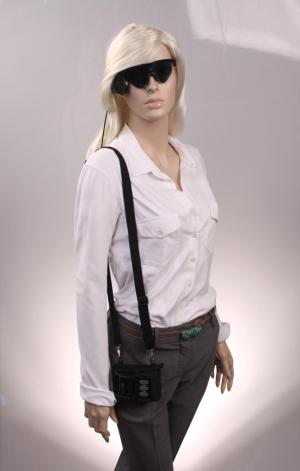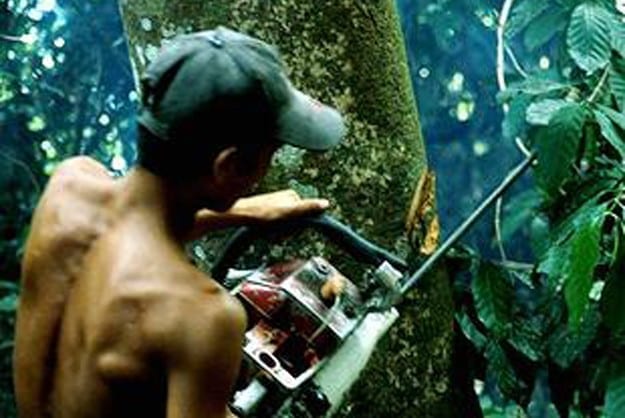
Monash University is preparing to launch technology that should allow blind users to make out objects and other people
World-leading technology that could help restore vision to a large number of Australia‘s 45,000 blind people is set to emerge from a Melbourne university.
The Monash Vision system, developed by a team of 60 at Monash University, allows blind users to make out objects and other people with the aid of a brain implant that connects wirelessly to a camera which can be housed in a pair of glasses or even on the end of the user’s finger.
The camera captures and sends images via a digital processor to a chip implanted under the skull at the back of the head. This chip stimulates the visual cortex via electrodes, allowing the brain to interpret the images.
The technology will allow blind people to see objects as a series of dots or solid colours. Facial recognition software lets the user identify other people, while other bespoke software, such as technology allowing users to recognise and negotiate stairs, is compatible with the system.
Monash researchers expect to release a prototype, which will be tested before being trialled on a blind person, in the first half of next year. It’s hoped that the trial, if successful, will lead to the widespread use of the technology within a decade.
Project director Prof Arthur Lowery told Guardian Australia the technology was a “major breakthrough” from previous sight-giving innovations.
“It’s the most advanced system created as it allows people to recognise different objects and colours,” he said. “It means people can go into a meeting and know who is there and how many of them there are. People can venture outside because they can see trees.”
Lowery said the sight provided would be similar to an advanced type of radar and was suited to completely blind people.
“If you have some residual vision it’s probably of less use to you,” he said. “You wouldn’t lose the vision you had but this is only presenting a few hundred pixels and most people with residual vision have more than that. We are aiming at people who are completely blind and have brains which are hardwired to understand what objects are, rather people who have never seen anything at all.”
The Latest Bing News on:
Bionic eye
- Apple iPad (10th Generation): with A14 Bionic chip, Now 17% Offon April 28, 2024 at 8:05 am
Welcome to the future of tablet technology with the 10th Generation Apple iPad that's currently available on Amazon with a fantastic 17% discount. Infused with the A14 Bionic chip, an astonishing 10.9 ...
- The Best iPads, According To An Apple Experton April 27, 2024 at 8:59 am
Whether for work or for play, the best iPads feature powerful processors and long battery life. Here our top picks.
- Deciphered Herculaneum papyrus reveals precise burial place of Platoon April 25, 2024 at 10:33 am
Most notably, the historical account of Plato being sold into slavery in his later years after running afoul of the tyrannical Dionysius is usually pegged to around 387 BCE. According to the newly ...
- The Herculaneum scrolls indicated where Plato was buried — they were read «by the bionic eye»on April 25, 2024 at 4:54 am
Three years ago, a research team at the University of Pisa decided to decipher the Herculaneum Scrolls using a new technology known as the «bionic ey ...
- A 'bionic eye' scan of an ancient, scorched scroll points to Plato's long lost gravesiteon April 24, 2024 at 11:56 am
Technology continues to reveal new details written on parchment burned by the Mount Vesuvius eruption of 79 CE.
- Slog AM: First Seattle Police Shooting This Year, Supreme Court Hears Idaho Abortion Case, Senate Passes TikTok Banon April 24, 2024 at 9:23 am
Now to Ashley for a brief interlude… The first police shooting of the year: The King County Medical Examiner’s Office has released the name of the suspect Seattle police killed last week in a sting ...
- Plato’s final resting place revealed using ‘bionic eye’on April 24, 2024 at 8:08 am
Researchers believe that they have identified the location of Plato’s burial site. According to their findings, his final resting place appears to be in a private area in a garden in the academy, near ...
- Wednesday briefing: Ukraine aid; TikTok ban; David Pecker at Trump’s trial; Supreme Court abortion case; campus protests; and moreon April 24, 2024 at 5:36 am
The Supreme Court will hear arguments today about emergency room abortions. College protests over the Israel-Gaza war are continuing to spread.
- Mystery of Plato’s final resting place solved after ‘bionic eye’ penetrates 2,000-year-old scrollon April 23, 2024 at 11:16 pm
The mystery of Plato’s final resting place appears to have been solved after advanced scanning techniques dubbed a “bionic eye” were able to penetrate a 2,000-year-old carbonised scroll.
- Restoring sight is possible now with optogeneticson April 23, 2024 at 3:31 am
Several companies are experimenting with optogenetics to create a “bionic eye” that can restore sight in visually impaired people.
The Latest Google Headlines on:
Bionic eye
[google_news title=”” keyword=”Bionic eye” num_posts=”10″ blurb_length=”0″ show_thumb=”left”]
The Latest Bing News on:
Vision restoration
- San Rafael activists lobby for train depot restorationon April 27, 2024 at 12:21 pm
San Rafael Heritage members said they want to see the depot enclosed rather than open into a courtyard. “Part of the vision is to recreate an interior space like the original waiting room in the depot ...
- Science Corporation acquires retinal implant from Pixium Visionon April 26, 2024 at 6:39 am
S cience Corporation, a brain-computer interface technology company, has announced the acquisition of intellectual property and related assets for the Prima retinal implant from French bioelectronics ...
- Eyes wide open: Breakthrough blink restorationon April 25, 2024 at 4:34 pm
N.K. often happens after an infection or trauma to the head or neck. Brain and skull base tumors are also common causes of N.K. Failing to blink can damage the cornea, causing cloudy and blurry vision ...
- BCI maker Science acquires retinal implant from Pixium Visionon April 25, 2024 at 12:54 pm
Brain-computer interface developer Science Corporation acquired the IP and related assets for the Pixium Vision Prima implant.
- KAUST, NEOM Unveil World's Largest Coral Restoration Projecton April 25, 2024 at 9:11 am
King Abdullah University of Science and Technology (KAUST), in collaboration with NEOM, has started working on the first nursery of the KAUST Coral Restoration Initiative (KCRI), a statement from ...
- Work starting on two-way restoration project of Adams Street and Forsyth Streeton April 24, 2024 at 5:32 pm
Adams Street and Forsyth Street will be restored from one-way roads to two-way roads. JACKSONVILLE, Fla. — Work has begun on restoring two roads through Downtown Jacksonville to two-way streets. Both ...
- Vision for the Corn Palace, Lake Mitchell, council relations highlight key topics at early mayoral debateon April 24, 2024 at 4:49 pm
Among the key questions the candidates fielded during the debate held at James Valley Community Center ranged from Lake Mitchell restoration, plans for the Corn Palace and what motivated each ...
- Tourism Sector Operation In Economic Modernization Vision Executive Programon April 24, 2024 at 2:45 am
A recent report of the Executive Program for Economic Modernization Vision has shed light on the intricacies of Jordan's tourism sector operation during the first quarter of 2024, emphasizing the ...
- Restoring sight is possible now with optogeneticson April 22, 2024 at 11:30 pm
(Carolyn Fong for The Washington Post) Therapeutic optogenetic therapy for vision restoration certainly has promise, according to Anand Swaroop, a senior investigator at the National Eye Institute ...
- Man who runs Houston classic car restoration business accused of swindling customers out of over $100Kon April 18, 2024 at 6:56 pm
A man who runs a Houston car restoration business is wanted on accusations that he swindled customers out of over $100,000.
The Latest Google Headlines on:
Vision restoration
[google_news title=”” keyword=”vision restoration” num_posts=”10″ blurb_length=”0″ show_thumb=”left”]










